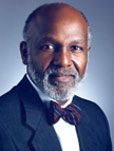
25th Anniversary Distinguished Lecture Series
25th Events
 Grand and Not-So Grand Challenges for Engineering
Grand and Not-So Grand Challenges for Engineering
Wesley L. Harris
Sigma Xi Distinguished Lecturer
Charles Stark Draper Professor of Aeronautics & Astronautics
Massachusetts Institute of Technology, Cambridge, MA
Fri., March 23, 11 a.m., Davidson Auditorium (SOM 1.118) Refreshments: 10:45 a.m.
Abstract
The source and context of the 14 National Academy of Engineering [NAE] grand challenges for engineering are discussed within a time frame of 2010-2030. Following a review of the major accomplishments of engineering in the 20th century, this lecture will focus on the risks and rewards of making advances toward goals of the grand challenges for engineering. In the environment of a global, knowledge-based economy and a major shift in U.S. federal support for basic research, the requirement for human/educational and fiscal capital in an integrative, flexible framework is outlined. A useful role for U.S. engineering schools, as an enabler in obtaining the goals of the grand challenges for engineering, is discussed.
Bio
Wesley Harris currently serves as the Draper Professor of Aeronautics and Associate Provost at MIT, where he also previously served as head of the Department of Aeronautics and Astronautics. Other roles have included: Associate Administrator for Aeronautics at NASA; Vice President and Chief Administrative Officer, The University of Tennessee Space Institute; Dean, School of Engineering, University of Connecticut; and faculty and administrative positions at MIT from 1972 to 1985. His research focuses on unsteady aerodynamics, aeroacoustics, rarefied gas dynamics, sustainment of capital assets and chaos in sickle cell disease. He has held distinguished, endowed professorships and lectureships and in addition, has served on various boards and committees of the NRC, NSF, the U.S. Army Science Board, the American Institute of Aeronautics and Astronautics, the American Helicopter Society, the National Technical Association and as a member of the Board of Trustees at Princeton University. Harris earned a BS degree in Aerospace Engineering from The University of Virginia and an MA and PhD in Aerospace and Mechanical Sciences from Princeton University.
Updated:
March 16, 2012
Copyright © 2011 The University of Texas at Dallas

